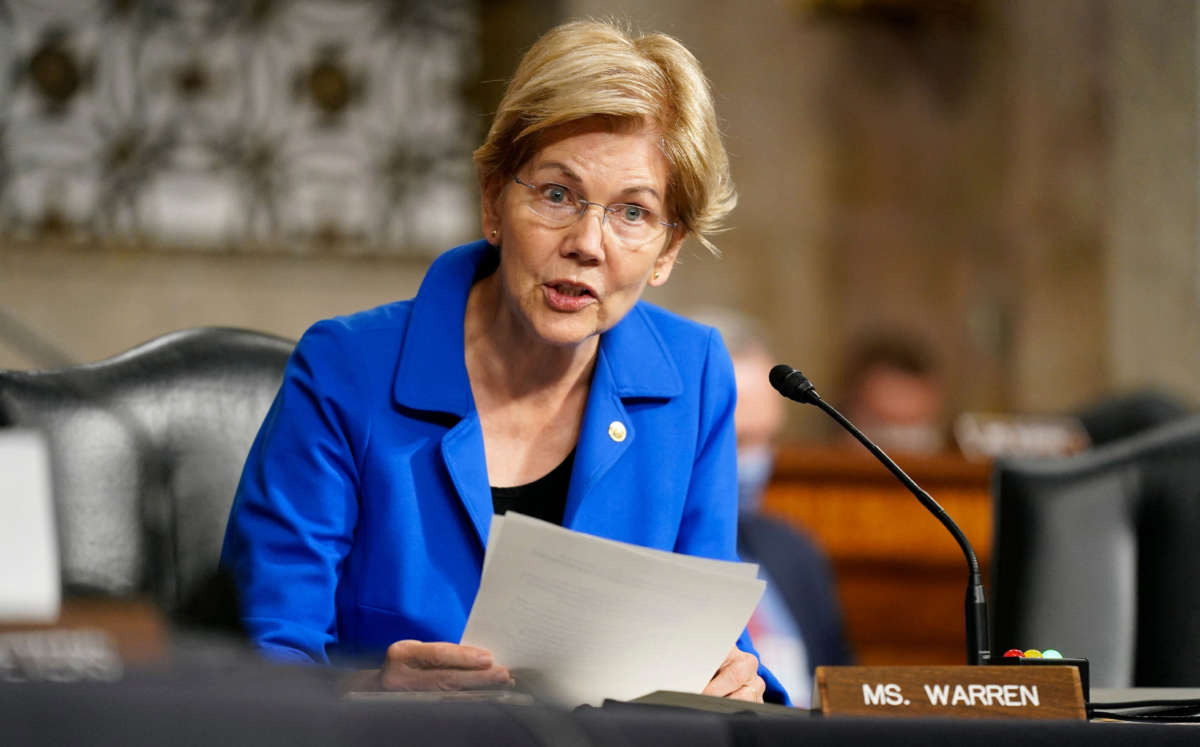Honest, paywall-free news is rare. Please support our boldly independent journalism with a donation of any size.
On Thursday, Sen. Elizabeth Warren (D-Massachusetts) introduced a bill that would reform the way the government authorizes bank mergers. The proposal is an effort to stop the endless “rubber stamping” of bank consolidation, which Warren argues comes at the expense of customers and small banks.
The Bank Merger Review Modernization Act, introduced with Rep. Jesús “Chuy” García (D-Illinois), would strengthen rules for the authorization process for bank mergers, in hopes of ensuring that future mergers serve the public. The act creates protections to make the process more transparent and to evaluate the financial risks that may emerge from a merger.
“In recent years, our banking sector has become more and more dominated by the largest banks. Community banks are being gobbled up by larger competitors or forced to shut down because they can’t compete on a level playing field,” Warren explained in a statement. “This results in more concentration, higher costs for consumers, and increased systemic risk to our financial system.”
The bill “would ensure that regulators do their jobs by stopping mergers that deprive communities of the banking services they need and help prevent another financial crisis,” Warren continued.
As the lawmakers point out, between 2006 and 2017, the Federal Reserve approved 3,819 bank mergers, not rejecting a single application. The last time the Department of Justice challenged a bank merger was 1985, and regulators haven’t formally denied a merger in 15 years. Because of Fed’s and other federal regulators’ lax enforcement of merger guidelines, the number of banks has declined rapidly over the past few decades, going from over 18,000 banks in the mid-to-late 20th century to less than 5,000 now.
The bill, which García and Warren previously introduced in 2019, is part of a larger Democratic effort to crack down on big banks and anticompetitive business practices across the country. Indeed, the bill would require federal regulators to examine the potential anticompetitive effects of a bank merger on banking services like mortgage and business lending.
At a hearing in August, Warren pointed out that Federal Deposit Insurance Corporation (FDIC) regulators aren’t required to reject a merger if it would create a bank that’s larger than the government can regulate. Regulators also aren’t required to reject mergers if they would reduce competitiveness and result in higher costs for consumers, or if the banks attempting to merge haven’t received high scores on their service to the community.
“Merger review has become the definition of a rubber stamp,” she said. “Regulators have no credibility on mergers.”
She and García are especially concerned with how bank mergers affect the public. Research suggests that bank mergers often increase costs for consumers while simultaneously reducing the availability of bank services. Mergers can also lead to financial instability for the country at large, and the lawmakers say that the current era of deregulation hearkens back to the “Too Big to Fail” mentality that led to the 2008 Great Recession.
The bill aims to ensure that future bank mergers would have positive effects for the communities they serve. It would only allow mergers between banks with high rankings via the Community Reinvestment Act, which was enacted in the 1970s to score how banks are serving low- and middle-income communities.
“This bill is a long overdue step to ensure that bank mergers are good for the public,” said Jesse Van Tol, president of the National Community Reinvestment Coalition. “For decades, federal bank merger law has recognized that there must be a public benefit in terms of increased access to affordable credit. This bill finally spells out what banks must do to meet that requirement. Mergers should not be approved by regulators if the only benefit is a bigger and more profitable bank.”
A terrifying moment. We appeal for your support.
In the last weeks, we have witnessed an authoritarian assault on communities in Minnesota and across the nation.
The need for truthful, grassroots reporting is urgent at this cataclysmic historical moment. Yet, Trump-aligned billionaires and other allies have taken over many legacy media outlets — the culmination of a decades-long campaign to place control of the narrative into the hands of the political right.
We refuse to let Trump’s blatant propaganda machine go unchecked. Untethered to corporate ownership or advertisers, Truthout remains fearless in our reporting and our determination to use journalism as a tool for justice.
But we need your help just to fund our basic expenses. Over 80 percent of Truthout’s funding comes from small individual donations from our community of readers, and over a third of our total budget is supported by recurring monthly donors.
Truthout has launched a fundraiser, and we have a goal to add 273 new monthly donors in the next 72 hours. Whether you can make a small monthly donation or a larger one-time gift, Truthout only works with your support.
